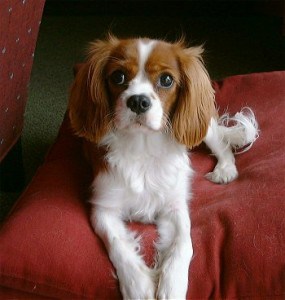From the desk of Sharda Baker
Good day and welcome everyone!
This is Sharda with another Cavalier King Charles Spaniel newsletter.
Let’s check out if Cavalier King Charles Spaniel characteristics really for you and/or your family.
Here we go!
As with any breed of dog, there are certain factors that need to be considered before deciding if the breed is right for you and your family.
The Cavalier King Charles Spaniel has lots of positive attributes, but there are also some considerations that need to be addressed before deciding if this is the right dog for you.
ATTENTION
Bred for over four hundred years to be a companion dog, the Cavalier King Charles Spaniel does need to be with humans as much as possible. This is definitely a housedog, and will not thrive or do well if raised in a kennel or as an outside pet.
They also do not do well in homes where they are alone for most of the time. Even with other dogs in the house, they still require human attention, and will often resort to poor or problematic behaviours such as chewing, barking or messing in the house if left alone for too long.
Cavalier King Charles Spaniel puppies need to be with people throughout their full development, and should not be left alone for a whole day at a time on a regular basis.
If you want a dog that is with you constantly and needs to be by your side, then a Cavalier King Charles Spaniel is a good breed to have. If you want an outside dog that is more of a guard or watchdog, this is not a breed that you should consider.
FENCED AREA
If you have a small yard or even a large area for your Cavalier King Charles Spaniel, it will need to be fenced. This breed comes originally from hunting spaniels, and still has the hunting spirit.
They are known to chase squirrels, rabbits and even birds, and become so caught up in the chase they will run onto roads or even into busy traffic. For the protection of the dog, they should always be kept in a fenced enclosure.
HEALTH CONCERNS
Generally a healthy breed overall, there are some hereditary and genetic conditions that are found in the Cavalier King Charles Spaniel breed. If you are considering purchasing a puppy or a young dog, be sure to buy from a breeder that knows the ancestors of the puppy and can vouch for a clean bill of health for the line.
As with any dog, the Cavalier King Charles Spaniel will require regular vet checks, and good nutritional care as well as exercise to stay healthy and in the best possible shape.
FOOD
Cavalier King Charles Spaniels are prone to putting on weight, so a careful watch must be kept on their diet and exercise level. Since the breed can be very sedate and prefer to sit around the house, the level of food intake should be monitored on a regular basis.
These dogs are also excellent at learning to gaze up at owners with their expressive eyes and earn a few treats. While this is not a bad practice occasionally, care needs to be taken to not allow treats to become the main part of the diet.
GROOMING
While the breed does not require any particular type of specialized grooming, the long hair does tend to tangle and mat easily, so the dogs should be well brushed at least once a week if not more frequently.
The hair around the ears and behind the front legs is prone to matting, and needs to be combed to prevent this. The hair is long and wavy but never curly, so is easy to brush with a wire bristle brush.
The Cavalier King Charles Spaniel does shed an average amount, and with the longer hairs it can appear that they are shedding more than they really are.
The Cavalier King Charles Spaniel should only be fully bathed when necessary, as too much bathing will remove the natural oils of the hair and skin and lead to problems. Dry bathing with powder can be done as necessary to help move dirt out of the coat.
TRAINING
Just like every other breed of dog, some Cavalier King Charles Spaniels will be easy to train and some will be more difficult. While a very intelligent breed, they also can be challenging to work with if they feel that they are in control. The breed responds very well to positive rewards and attention, and should never be punished or yelled at as a training method.
I hope that you learned a lot from today’s Cavalier King Charles Spaniel newsletter
All the best and take care
Warmly,
Sharda Baker

